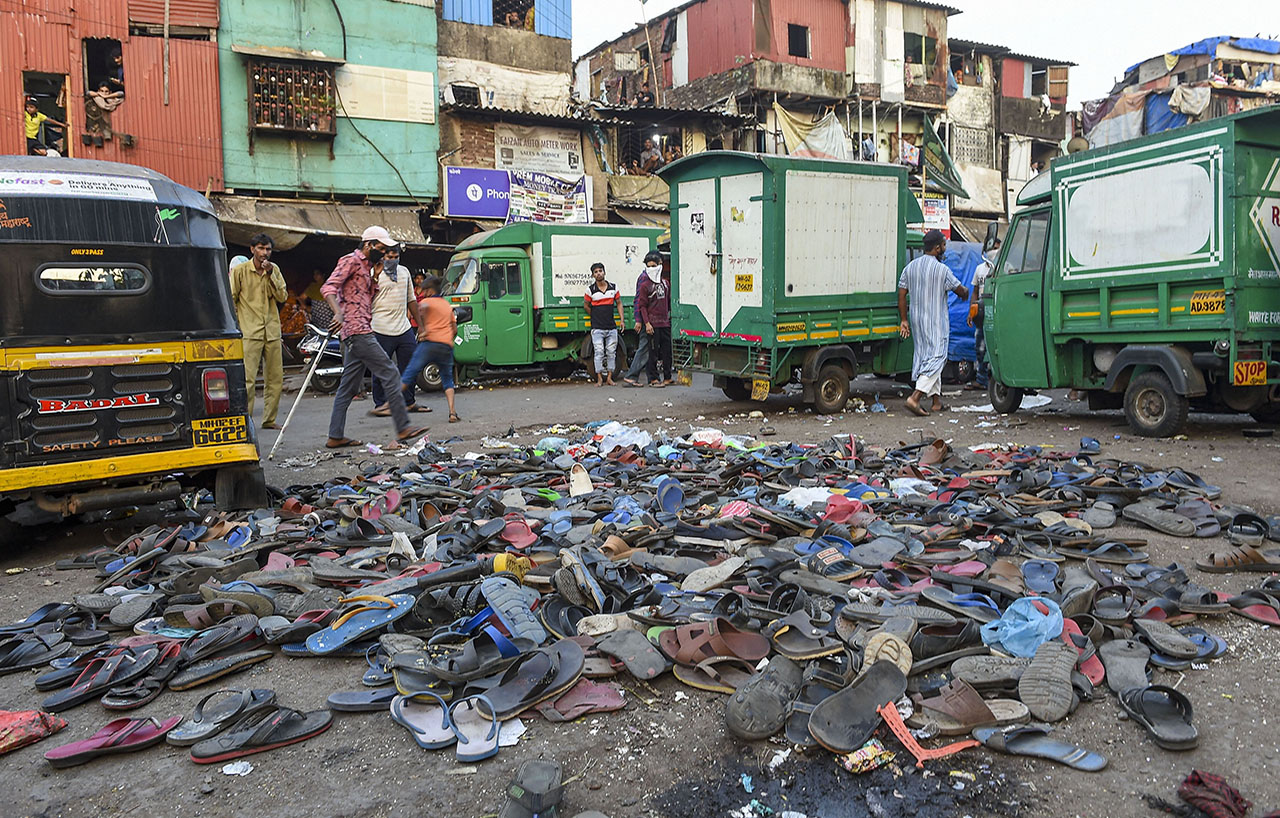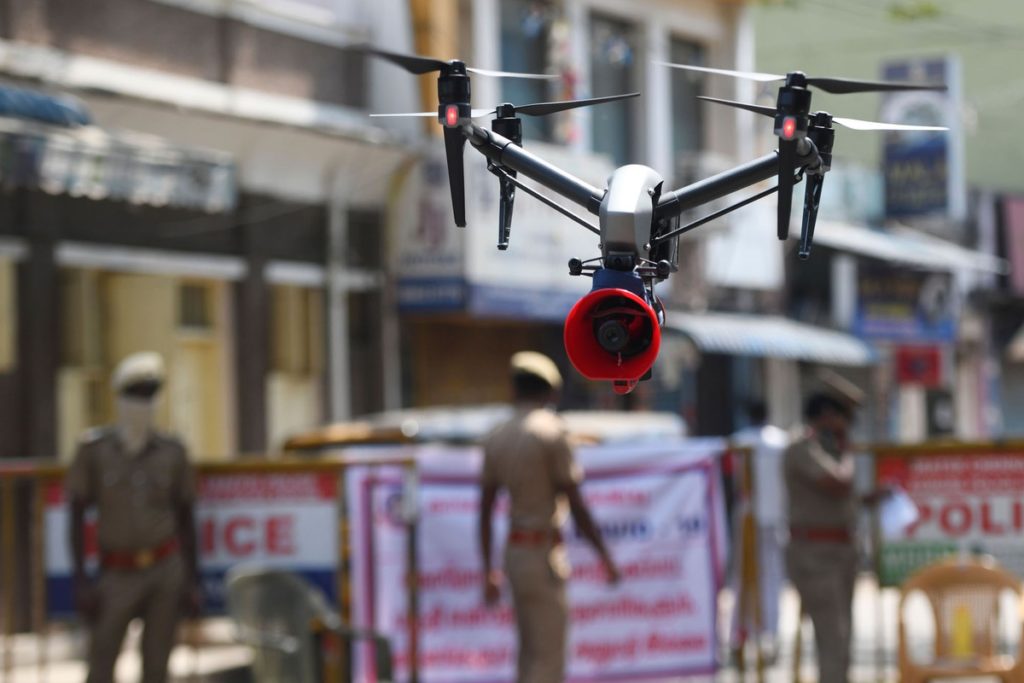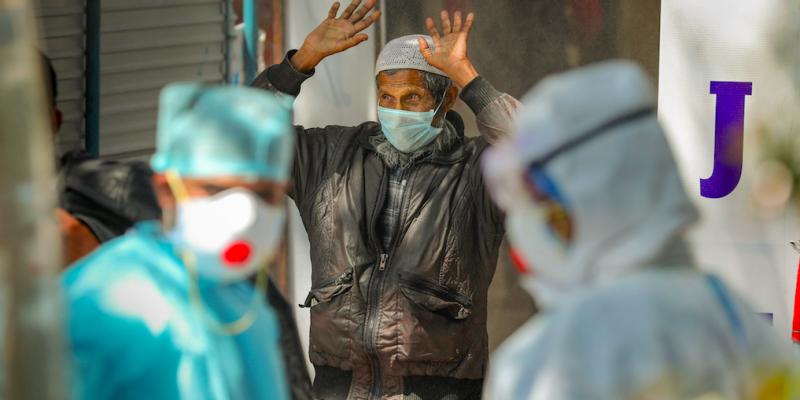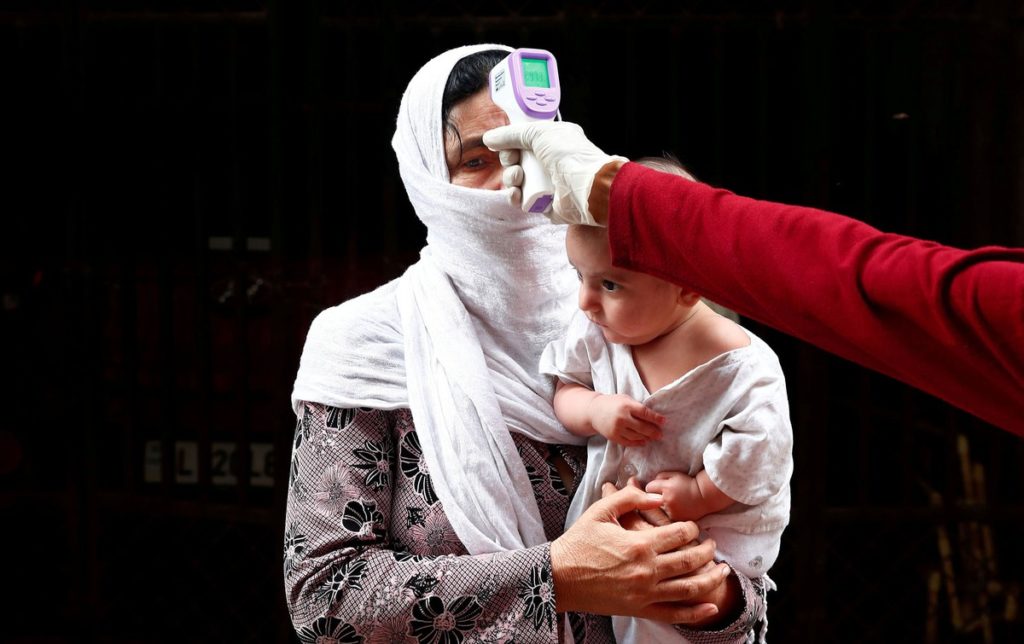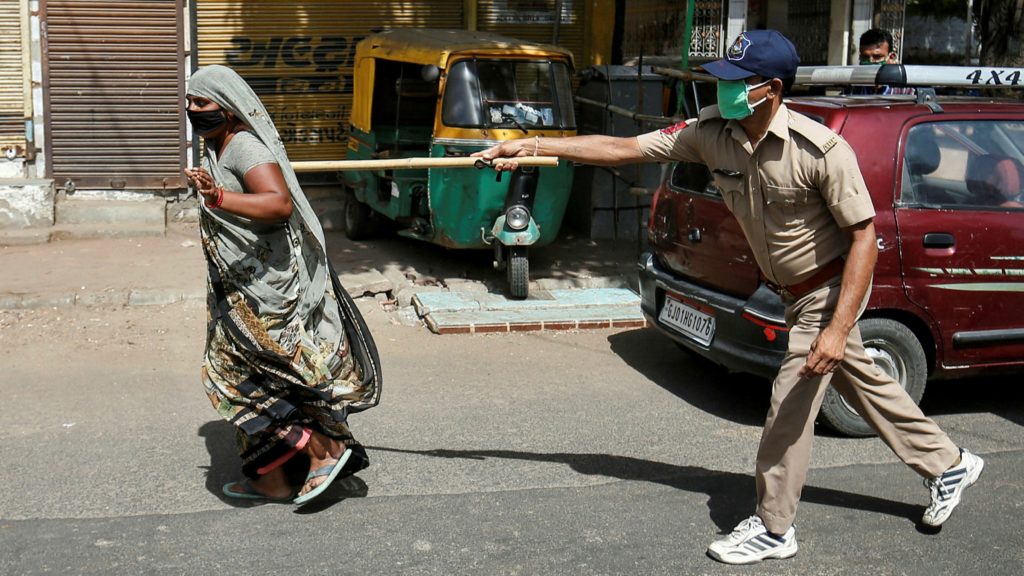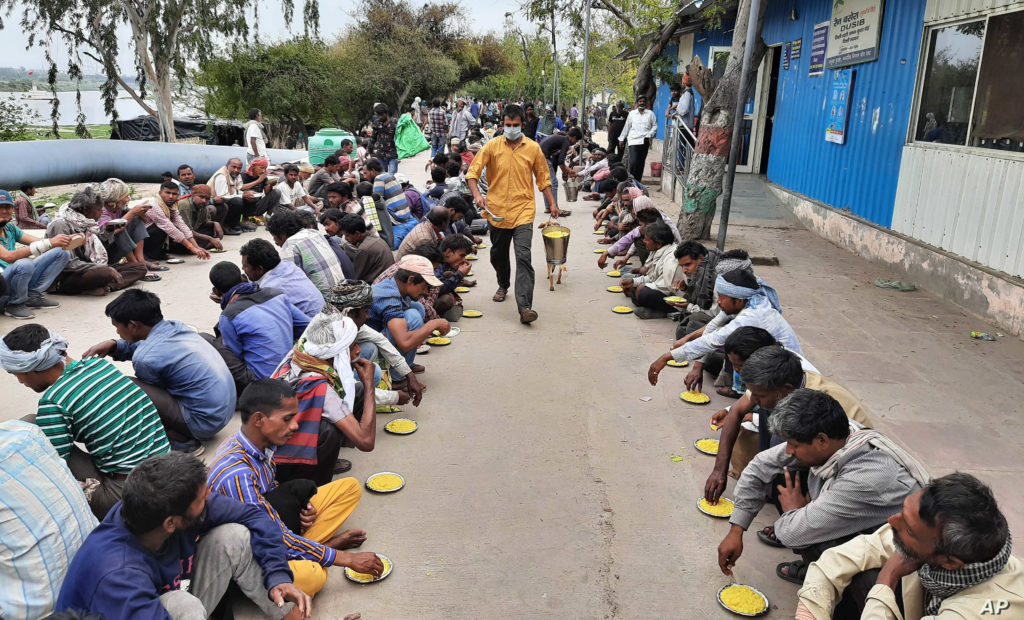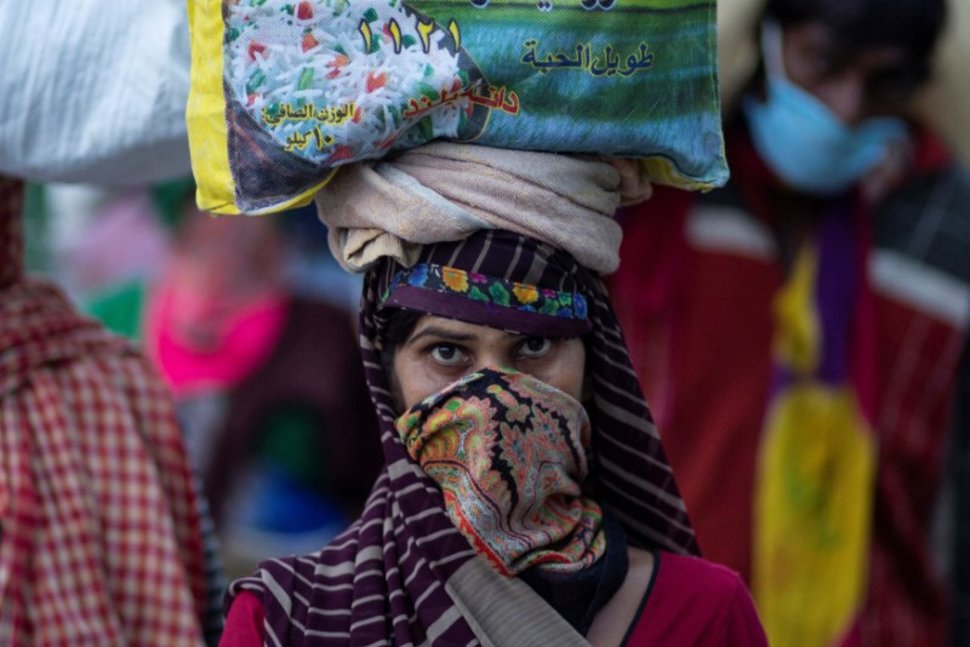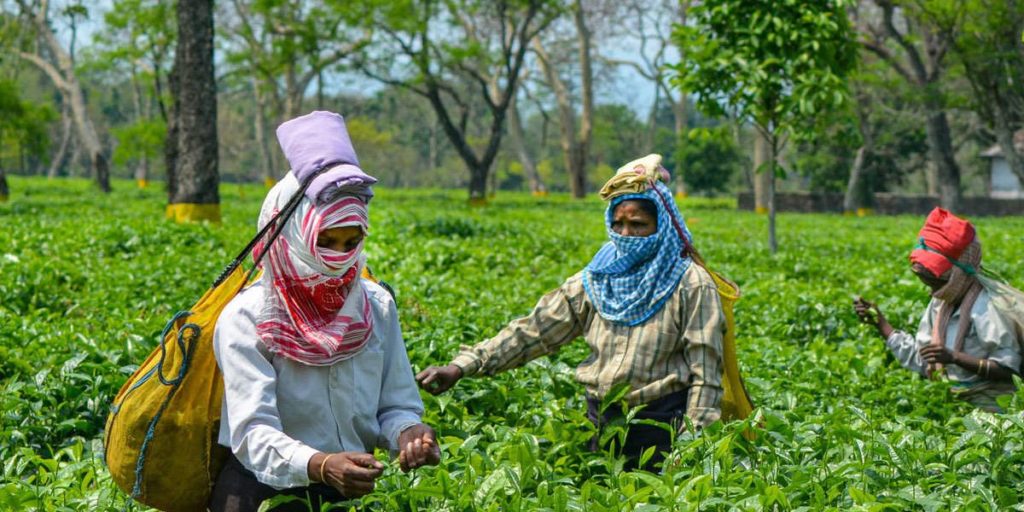States respond in an apparently chaotic manner to pandemics like Covid 19, about the spread and endurance of which even the medical community knows little. But there are various forces that work on the policy makers in ways that are reasonable from their respective perspectives. The outcome is the resultant of these forces.There are, similarly, various paths one can take to make sense from this chaos. In this article, the author Pranab Basu, tries to understand the relation between Covid 19 and governance. This article was germinated by the insights offered by Matthew G. Hannah, et. al. in ‘Thinking Through Covid-19 Responses With Foucault – An Initial Overview’ in Antipode, 20 May, 2020.
War and Security
The ideas of ‘security’ of the population and ‘war’ against Covid are frequently used to justify policies initiated for the containment of the pandemic. These ideas are malleable and in the context of the virus, which is an enemy within, that needs human cells as host and also for replication, the targets keep shifting in directions related only tenuously to infection vectors. The government says, a war against Covid 19 has been waged for the security of the population. But, the virus is lodged in the body cells of human beings, most of whom bear no mark of their alliances with the enemy i.e. they are asymptomatic. The bodies are the fifth columnists that, even unknown to the beings who inhabit the bodies, induct other bodies into their fold, simply through social interaction of human beings. The whole body of society is a sleeper cell that is activated just through social interaction. So, lockdowns have been proposed as the strategy of war.
Lockdown, at least in principle, segregates the population into small groups, mainly family. This is the suspension par excellence of social interaction, and of society at large. This is what the Iron Lady, Margaret Thatcher, had argued for in the famous interview in 1987. “There is no such thing as society”, she had said. Remarkably, the only social organisation that she had pleaded for was the family, which was necessary for inculcating the proper values (of docility and religious conservatism). And it is the only social aggregation that continues to flourish in a lockdown. So the neoliberal utopia owes its decisive victory not to any social engineering, but to a pandemic.
The war against the unmarked enemy allows the targeting of social groups of choice. This is what we meant when we referred to shifting targets. The enemy being within and unmarked, the socio-political power play constitutes particular social groups as enemies. Thus, in our country, Muslims are targeted by Hindus, one linguistic group by another, and even returning migrant workers and health workers are targeted by their fellow community members, all in the name of war against carriers. The strategy of security of the population displaces into war of some against others and into a strategy of governance through surveillance.
Surveillance
As part of the war against Covid 19, surveillance state is emerging not just in India (where the population is under surveillance through the ArogyaSetu App) but, according to Amnesty International’s Bulletin of 20th April, 2020, countries like Austria, Belgium, Italy, the UK, Germany and South Korea have all publicly declared that citizens are under GPS surveillance, ostensibly to track the spread of Covid 19. Surveillance is argued to be necessary for tracking the social contacts of infected persons. The silent mutation of neoliberal governmentality (that was supposed to mean economy in governance) to a disciplinary regime, working through declared surveillance, needs some thought. Of course, it’s not a big deal in India where most of the population has been silently complicit in the unending lockdown in Kashmir and the surveillance state in Kashmir and large tracts of the North-East.
In the recent past, non-state outfits have also been deployed to terrorise and kill dissenters, and even nondescript Muslim traders. But in countries that have strenuously nurtured a commitment to notions of “individual freedom”, this sudden turn to surveillance, may, at first glance, seem surprising. In fact, however, there is a strong continuity here with neoliberal governmentality. Margaret Thatcher said in an earlier interview in 1981 “If you change the approach you really are after the heart and soul of the nation. Economics are the method; the object is to change the heart and soul.” (emphasis added). I interpret this pitch for the heart and soul of the citizens as the insemination of desire for the neoliberal way of life. Of course, at that point of time Thatcher was not referring to desire for surveillance, but the continuity lies in the mode of governance where the governed desire to be governed. We desire to be tracked through GPS for our own security. We desire the annulment of society so that our bodies may live. (It would not be out of place to remark that with the rising tide of conservatism that is engulfing the globe, large sections of the population have, even before the pandemic, been clamouring for surveillance of minority ethnic and religious groups to ensure safety of dominant communities from various perceived threats from such communities.)
Even what is apparently a disciplinary apparatus, conforms to the neoliberal principle of evolution of the governed into individuals desiring governance. Perceived proximity of death arouses desire for staying alive. But this life of the body is at the cost of death of social being, the life of our species. We are suspicious of neighbours. Rumours play a major role in the cultivation of distrust. Our complicity in governance, motivated by our desire for the security of life, is often channelized through rumours. As in every situation of civil strife, rumours play a key role. In urban localities, you can even settle scores by spreading the rumour that someone in a family is back after spending some days in some other place. Or, better still, has been to the hospital for Covid 19 tests.
It’s Not Conspiracy, But Desire
There is no doubt that absence of social congregation and the desire of the citizens for surveillance is a boon for state power, but that is not to say that the neoliberal state at the behest of global capital took advantage of the pandemic to initiate these changes. Why do a lot of the leftists and liberals acquiesce in these strategies? The reason, professedly, is for security of the population though, I strongly feel, it is simply for perceived security of self or, in plain words, because of fear of death. Remember that in our country, particularly, most of the leaders of the left and democratic parties (and of course the BJP) are ancient and belong to the segment most susceptible to fatality from Covid 19. Fear-desire percolated into the minds of those who matter to the state, through a process without a subject. Fear-desire was concretized into the strategy of lockdown, again, through a process that did not have any ostensible subject. But how did the ‘people’ arrive at the conclusion that the lockdown was the option? It should be mentioned that everyone did not come to this conclusion at the same time nor with the same conviction. Some never agreed with this conclusion. But the scientistic conclusion was in favour of a thorough lockdown. If cells in the human body are potential hosts of the virus and if it spreads through social interaction, then the scientistic solution is either to device means of preventing human cells from hosting the virus or to suspend social interactions.
The first can be implemented either through mass administration of vaccine or through attainment of herd immunity as a large proportion of the population is infected and recover with acquired immunity. Vaccine is not available, and unlikely to be so for the next two years. Some nations, notably UK, did try herd immunity initially. The trouble with this is that some succumb to the infection, instead of recovering with immunity. Though this proportion is not large, on an average, it is variable and apparently has been disproportionately high in European countries. Vocal public opinion forced almost all Western nations to fall in line and adopt lockdown. The argument for lockdown is that if it is not enforced, the number of infected persons would suddenly explode far beyond what the available health infrastructure can manage.
In this event the state would be forced to prioritize, leaving some to literally die, like was happened in Italy – the old and infirm with less chance of survival being denied attention. Lockdown, they say, will lead to the ‘flattening of the curve’ of infection to keep it within limits that can be managed by existing health care facilities. It is another matter that what is a ‘manageable spread’ depends on the existing healthcare facilities, which are widely disparate. Take the number of hospital beds available per 10,000 of population. While it is around 0.6/0.7 for India and Pakistan, it is 5.2 for Cuba, 8.3 for Germany, 4.2 for China and so on.
While the strategy of tackling the pandemic through lockdown supplemented with state surveillance, to track the infected was the product of a socio-psychological process, the twin strategies themselves have negative socio-psychological consequences that are ignored by opinion makers because of their dominant male chauvinist conservative anti-societal attitude. Destruction or suspension of society causes various kinds of psychological trauma because humans are, in general, gregarious beings. The obverse of locking down social interaction is the intensification of interaction within the family – the only social organization that is permitted to flourish. This too is fraught with its own trauma. There is increase in violence against women, sexual exploitation of children and marital conflict.
Lockdown: Beyond Scienticism
I can’t fathom whether it was the Modi government’s penchant for being more Western (in Modi suit) than the West or it was the pressure of the miniscule segment of citizens, who are considered opinion makers (mostly the SanghParivar intellectuals and crony capitalists), that decided that India should initiate the most stringent lockdown policies. The two forces, in any case, share a common lineage. We frequently condemn the SanghParivar for its Hindutwa agenda. This condemnation is certainly justified, but I sometimes wonder whether it is wise to cede the entire territory of Hindu philosophy to these bigots. After all the term ‘Hindu Philosophy’ simply connotes the philosophies that emerged within a certain geographical territory. These included myriad atheistic traditions too.
There were tolerant, inclusive philosophies also, that addressed questions of ethics using logical systems that, in some ways, are more productive and imaginative than the Western philosophies, that form the ground of most of our social critiques. The Savarkar strand of nationalism, which is the progenitor of the current SanghHindutwa, follows a particular tradition of Hindu philosophy. This reading of Hindu philosophy is based on the Manuvadi revivalism of Sankaracharya and reconstructs the history of the region as a macho, exclusionist tendency that can compete with the male, white Christian Philosophy of the West. This is a variant of Orientalist construction of the East as a lacking West. The Sangh philosophy just inverts the Orientalist vision, constructing the West as a lagging or latter day East. And as we now know, inversion is a form of repetition[1].So we have to be doing the things the West does, and more intensely. This could be the ground for implementing the harshest lockdown in the world. Meanwhile, we are almost into the third month of a grotesque lockdown.
I am calling the Indian lockdown grotesque because the norms are being changed; definitions of designated zones are being continuously modified; people are breaking or being forced to break social distancing norms because of the poor living conditions of the majority; the government, in the latest edition of lockdown has even permitted the opening of hair cutting saloons and beauty parlors! In the meantime, the poor are dying in hundreds as a result of the government’s thoughtless measures. Amidst this chaotic lockdown, the only certainty is that none of the editions of lockdown in India were adopted keeping in mind the needs of the marginalized poor. Of course, there was no reason to! The scientistic defence of lockdown as the means of containing the pandemic imagines lockdown as a cessation of all social activity.
This cannot adequately define the policy. This is a scientistic ideal that is not practical for several reasons. Society is not homogeneous. There are class and non-class economic differences; differences in faith and beliefs; ideological and cultural differences; to name a few. Such differences influence perceptions about the need of lockdown and surveillance. A migrant labourer from West Bengal working in Kerala is most unlikely to favour a lockdown that leaves him stranded thousands of miles away from home without a job; neither is a person who subscribes strongly to democratic freedom of association likely to support the policy of surveillance for whatever purpose. The capitalist is unlikely to support a long term lockdown policy because the circulation of bodies is just as vital for many capitalist processes as the circulation of capital. Religious groups are unlikely to support the ban on religious congregation. Then there is a vast segment that is simply irked by the need to wear a mask, say. The policy that emerged and evolved had to adapt to these differences of opinion among the population segments whose support is valuable to the ruling dispensation. There are also practical needs of governance that the government had to take into account. Everyone does not desire lockdown.
Hence this has to be enforced. The enforcing authority – the police, generally – has to implement the lockdown. The idea of lockdown that emerged out of the desire of some to live paradoxically impinges on the freedom of some to fulfil the same desire– the marginalised segments, the hawkers, the casual workers who have no fallback and who live off their daily earnings. Obviously there are points of friction between government and these segments, sometimes resulting in violent conflict. Containment of such social friction requires not just the circulation of law enforcers but circulation of relief givers. There is an optimum rate of deaths from starvation and the long journeys homeward that is permissible — probably partly determined by Arnab Goswami and his ilk — but also defined by the needs of persuading the dissenters. So the government has to allow others and itself to organise relief at the same time, to keep deaths economical. This, too, requires social contact beyond the family.
Containment thwarts the ‘circulation of bodies’, which as observed by some, is essential for economic activities. This is not entirely necessary as quite a lot of market productive activity can nowadays be performed through work from home. But definitely material productive activity is suspended as a result of a complete lockdown. The impact of this suspension is skewed, more so in India where a large part of the labour (around 85%) is informally engaged or self employed. The distress is more pronounced for the migrant labourers. Based on research using NSSO data, The Indian Express reported in its 19th May edition that of the 65m interstate immigrants, about 21.5m are workers and of this about 13m are either casual workers or work regularly in the informal sector. If street vendors who are not counted among workers are included, the report concludes that there would be around 18m interstate migrants who are out of work because of the lockdown. In fact, this figure is difficult to assess. Nitin Sinha who is a senior research fellow at Leibniz-ZentrumModerner Orient, Berlin and works on informal labour claimed in The Wire, 15th May, 2020, that by a conservative estimate the number of migrants informally employed would be 100 million.
The figure of migrant bodies on tracks, of chapattis strewn, the hunger of those who clung to them snuffed out with their lives, these are the iconic representations of these hapless workers trudging back to their home states. After a series of protest that spread across the nation, the central and state governments were forced to arrange for a semblance of transport for these returning migrants. ‘Semblance’ is the word as thousands still kept trudging back along highways and train tracks, beaten up by police, sprayed with chlorine water and subjected to all kinds of indignities, but they still kept coming like sleep walkers.
For the upper crust, whose fears and desires shaped the policy, initially lockdown was just an irritant, at worst. There is very little meaningful socializing among this segment. They mostly meet at clubs, these meetings having only indexation value – designating your strata – rather than any psychological value as a support system. A few days off would not make any economic difference even to those among this strata that did not have an assured income. Beyond this was, mostly, the territory of ‘law and order’. No one bothered to take into account the disastrous socio-economic consequences that a sudden lockdown would have, particularly on the migrant workers. This was the immediate picture when the GOI imposed a near total lockdown.
But to the capitalist, too, the cost of prolonged lockdown was unbearable. The economy, already deep into recession was sliding further downwards; predictions were scary and the loss of immigrant workers from distant states was likely to hamper production in certain sectors even when productive activity was resumed. All this worked to persuade the capitalists that relaxation of lockdown was necessary. They could, of course, maintain their own safety, or so they imagine by working from home. Thus, the clumsy scaling down of lockdown through successive versions, rendering it virtually a farce, probably meant for consumption by the West.
Though the idea of imposition of lockdown and surveillance for controlling the pandemic was not the result of any conspiracy of international capital or the state, as some leftist critics would have it, yet this provided a delightful opportunity to the BJP government to further its political and economic agenda.
………….
[1] It would be interesting to note that variolation, which was the precursor of the vaccine was invented in a number of ‘oriental’ cultures including India and refined to a degree only in India. The interested reader may consult P. C. Ray, The History of Hindu Chemistry. Ray also observes that medical sciences abruptly stopped flourishing after the rise of Sankaracharya’s Brahmanical Hinduism that, among other things, severed the links of Hindu medicine with invasions into human bodies, dead or alive, which was the province of the lower castes and tied to the practice of Tantra within the Hindu tradition.
The author, Pranab Basu is a retired teacher. He taught at Ashutosh College (Kolkata) and at Visva-Bharati University.
Image courtesy – various sources on the internet. Feature image – Bandra, after police lathicharge on the workers demanding to be taken home.

